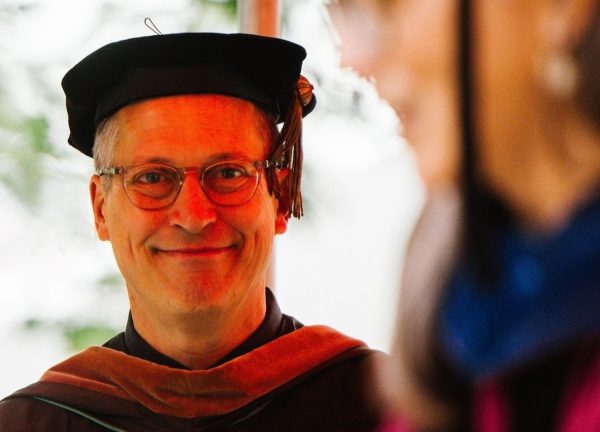Some remodeled newspaper boxes—including one at Kalamazoo College—are once again worthy of front-page news. And this time, they have the potential to save lives.
Haley Mangette, K’s assistant director of student success for wellness, works with the Kalamazoo County Opioid Coalition. Supporting the Coalition’s mission, the Community Outreach Prevention and Education (COPE) Network and Bronson Healthcare refurbish the boxes and install them around town as sites for the public to quickly and anonymously obtain naloxone.
The nasal spray, also known by the brand name Narcan, rapidly reverses an overdose by blocking the effects of opioids. It works within two to three minutes for a person whose breath has slowed or even stopped. A person can’t get high from using naloxone and it’s safe for practically anyone.
K’s newly installed box is located at Lovell Street and Campus Drive behind the Hicks Student Center.
“With fentanyl overdoses harming many people, the more accessible naloxone is, the more people are prepared to respond to an overdose and potentially save someone,” Mangette said. “A person can only move toward recovery if they’re alive.”
Naloxone was already available on campus through AED boxes in administration and classroom buildings, and at residence halls through resident assistant first-aid kits. The box, however, expands the spray’s availability, even for those who live beyond the campus’ borders.
“The U.S. has seen a decline in overdose deaths with the introduction of naloxone and the widespread promotion and training of individuals delivering it,” Mangette said. “COPE Network and Bronson Hospital have been able to install several boxes around the county, and ours will ease access for those around our area.”

Mangette works with students Sam Douma ’26 and Zane Jones ’27, who help her as peer educators in Student Development. Douma is a psychology major who has strong interests in writing, philosophy, and the intersection of computer science, new media and neuroscience. Outside of academics, he’s involved with K’s bike co-op and rock climbing. Jones volunteers with K Votes—the College’s non-partisan coalition that informs K students, faculty and staff members about voting and civic engagement—and works at Woodward Elementary School through the Mary Jane Underwood Stryker Center for Civic Engagement. They join Mangette in praising the installation and recognizing its potential to save lives.
“Having a naloxone box on campus is a perfect example of minimal effort, maximum impact preventative care,” Douma said. “A major part of our philosophy is based in harm reduction. In the event of an overdose, being prepared is critical. Having a naloxone box available could be lifesaving, whether for a student or someone from the surrounding neighborhood. Given Lovell Street’s visibility and traffic, placing a naloxone box there could make it a well-known resource, and not just for our campus, but for the broader community.”
“I’ve talked to my friends about it, and most of them didn’t know we had naloxone on campus until now,” Jones said. “I hope this makes it an accessible resource so it gets pushed to the people who need it, especially if we can offer some training with it.”
Douma and Jones meet with students individually, digitally through social media and the College’s website, and at various student events where they provide information and resources to help navigate complicated scenarios where they might face substance use on a college campus.
Help from them is only a click away should a student need it at their website or Instagram page. Mangette also is reachable at haley.mangette@kzoo.edu or by calling Student Development at 269.337.7209 for more information.
“We think it’s important to have peer educators because it’s easier for a student to talk to another student, and realistically, a student’s going to listen to someone their age rather than an authority figure,” Jones said. “It’s less scary for a student to come to someone like me on campus and I can just be real at the same time. We also love helping out in the community. I use the word resource a lot, but I believe we are good resources and it’s a great thing for us to do. It makes me feel good because I feel like I’m benefiting our community.”



















